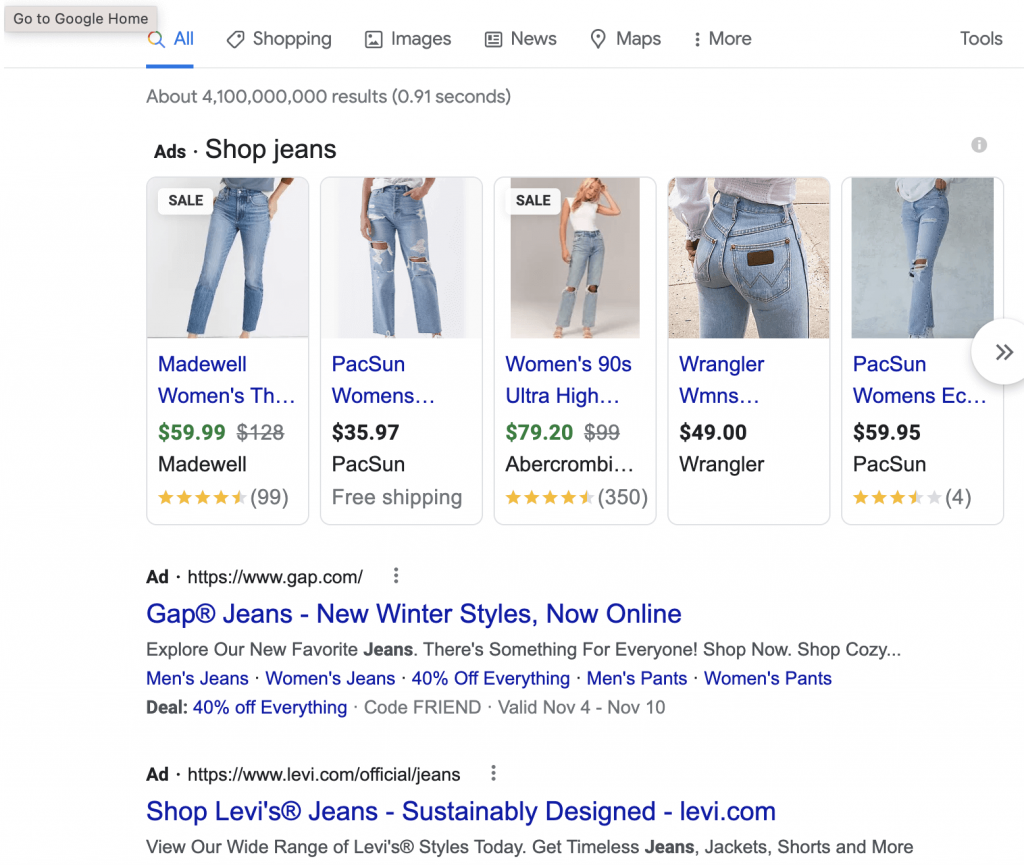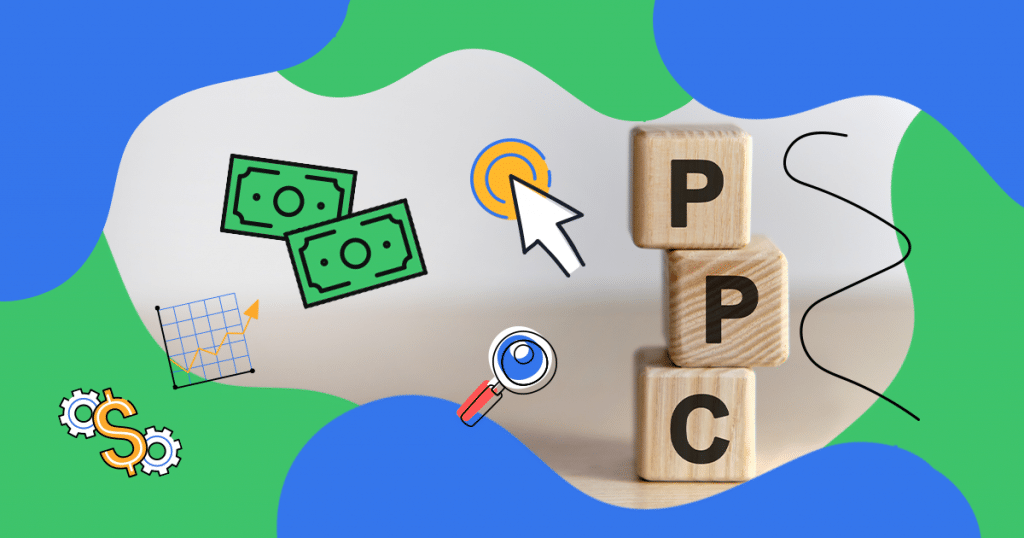Pay-per-click advertising (PPC) has proven to be an important part of a well-designed digital marketing plan.
This “pay to play” advertising strategy is an effective and affordable way to generate successful results.
PPC is also a valuable tool to test what ads work and what ads don’t work.
This article will share what PPC is, how it works, and why you should add it to your marketing plan. Plus, we’ll present six tips to keep in mind before getting started.
Are you ready to learn how PPC can help you build your brand and generate more conversions? Read on!
After All, What Does PPC Stand For?
If you want to expand your online reach and share your awesome products and services with the world, you should be including PPC in your campaigns.
Pay-per-click marketing is part of an online marketing strategy that will help you expand your customer base.
Unlike free organic reach that is getting smaller and smaller as time goes by, PPC are ads you pay for intended to get in front of your target audience faster.
In a nutshell, PPC buys visits to your website on the search engine result page (SERP).
You’ve probably seen quite a few of these when you search for something on Google.
The SERP will display your ad usually above or to the right of the search results to hopefully catch the eye of searchers, so they will click the link to your website.
Every time an interested individual clicks on the ad you pay.
When executed correctly, PPC will:
- Generate quality leads.
- Create a successful customer journey.
- Provide an impressive return on investment (ROI).
It’s a pay-to-play scenario, and it works.
Take a look at what appeared when we Google searched for jeans. There were millions of results, but the ads on the top really catch your attention.

Search engine giant Google gets more than 90 percent of all search engine market share worldwide and Google receives more than 63,000 searches per second every day.
Are you starting to get the PPC picture? It’s a good one.
What are PPC Models?
Search engine advertising is the top dog in PPC for many small businesses.
There are two types of PPC models that you should know. What one is best for your business depends on what you are selling, your marketing strategy, and how much you have in your budget.
Flat Rate Model
In the Flat Rate PPC, you work with the search engines to negotiate and agree on a fixed dollar amount for every ad click that is made.
There is usually a published rate schedule for keywords — the words and phrases that we type into search engines to find what we are looking for.
Simply put, it’s like an online popularity contest. The more popular searched keywords will cost more per click than those that get fewer searches.
So do your homework and research your industry’s keywords.
Bid Based Model
The Bid Based Model is like a real-time auction, and the highest bidder gets the most popular keyword.
You set a maximum price you are willing to pay for every time someone types in a relevant keyword while searching for something.
The auction determines who wins and whose ad will appear higher on the page.
This is called ad rank. There are other factors that go into bid-based model PPC including:
- The quality of your website’s landing page where the customer is directed.
- Expected click-through rate.
- Ad relevancy.
Each factor is based on the keywords used.
Flat Rate Models are beneficial if you need to maintain a certain, consistent budget. Bid Based Models are beneficial if your goal is to build your brand and expand your customer base.
Why PPC Marketing is Important for Boosting Short-term Success?
If you wanted to know why businesses should focus their attention on PPC, now is the time.
Provides Immediate Results
PPC Marketing drives immediate results. This, as mentioned earlier, is so much better than waiting for organic reach results.
Paying for effective marketing is timely, and you have the potential to instantly reach thousands of potential customers who are searching for your product or service.
Keep in mind that most online consumers use the internet daily to search for something they want to buy, either online or locally.
Builds Your Brand
PPC Marketing works for you 24/7 and is your brand-building big brother.
You want consumers to recognize your brand online, but you also want them to associate you with competitors they are familiar with.
This causes them to trust your brand.
Remember, people like doing business with people they know, like, and trust. The more your ad can appear next to your competitors the better.
PPC can make sure your brand appears in the right places, creating a consistently recognized brand and driving traffic to your website or brick-and-mortar location.
The end result is to convert visitors into customers.
Allows You To Re-Engage
If one of your goals is to strengthen your brand and increase customers to your website, PPC can assist in keeping track of visitors who didn’t purchase from you.
It’s true that most website visitors usually don’t purchase from a landing page.
That said, more than 95 percent of those visitors can be tracked and re-targeted, which is a major benefit of PPC.
Use this opportunity to re-engage by creating additional ads and content that encourage them to convert into customers.
Improves SEO Performance
SEO and PPC are different marketing strategies.
Strategically, they can work together to improve SEO performance and organic reach, too.
PPC ad campaigns can be a cost-effective testing opportunity to evaluate particular keywords and whether they are successful in driving conversions.
The immediate information you generate will support the keywords you are currently using or researching to find new ones that are better suited and adjust your organic keywords, too.
Helps Meet Your Overall Marketing Goals
PPC helps you measure how many people are seeing your ads and analyze how successful your keywords are.
This keyword impression data helps you build even more keywords and phrases that are more specific, and then optimize your content to reach your target audience.
The end result is meeting your overall marketing goals of appearing on the top of the search page in the ads and the organic results that follow below.
The more your links are displayed, the higher the chance is for people to click on them.
How to Guarantee a Successful PPC Strategy?
This might seem like a loaded question, but with some patience, determination, and a well-thought-out strategy you can create a successful PPC strategy.
Take a look at some things to add to your to-do list:
1. Optimize Your Website
Have you visited your website lately? You should.
Before you start your PPC campaign, it’s very important to update and optimize your website, creating landing pages that will work in conjunction with your ads.
When prospects click on your PPC ad, it’s because they liked the ad, and are interested in learning more.
If the link they click and it takes them to a page on your website that has nothing to do with the ad, they will probably leave and move on to your competitor.
In addition, make sure your website is current and easy to navigate.
If they like what they see on the landing page, they will likely go to more pages on your site like your blog or product description pages.
2. Set Specific Goals
It is very important to have specific goals for your ad strategy before you begin any PPC campaign.
Defining goals will help guide you to meet your objectives and select the platforms to place ads, as well as where you will get the biggest bang for your PPC buck.
3. Establish Keywords
As mentioned above, your keywords are instrumental in a successful PPC campaign.
This is a constant process but researching and writing down keywords that are relevant to your business will make it easier to create ads and content.
4. Create Relevant Content
The content for your PPC ad should engage your target audience and address their needs and pain points and solve a problem or fill a need for them.
Define your buyer personas and get to know what makes them tick. Create content that is relatable and just what they were searching for.
The goal is for your content to encourage them to click and visit your website for more information.
Use a strong active voice, attractive visuals, include at least one keyword and include a call to action phrase (CTA) like “buy now” or“register today” so they will know what you want them to do.
5. Design Persuasive Landing Pages
As mentioned above, a landing page is a place on your website where consumers who click on your ad will be directed to.
This is an important part of your PPC strategy. Since the goal of your ad campaign is to generate conversions, your landing page should have relevant, interesting, and persuasive content.
It should also be visually appealing. Give your visitor a reason to stay longer and learn even more about how you can make their lives better.
Incorporate keywords naturally, so Google and search engines will know that this landing page is associated with your ad and reward you with higher rankings on search results.
6. Review, Analyze and Repeat
Marketing is a dynamic ever-changing process.
Consumer behavior is predictable in some ways, while unpredictable in others.
Being flexible, creative and adaptable in your PPC ads and overall content allows you to continue campaigns that are successful and tweak those that aren’t.
Keep track of your results, review, analyze and repeat your PPC strategies.
Wrap Up
PPC ad campaigns are part of your online marketing tool kit that can catapult your business into a successful future.
But be advised: there are many layers to developing a well-designed program that provides results.
That is why you need to know the differences between PPC and CPC(cost-per-click). Luckily you can read all about it in our blog post!


![[Rock NA] State of Marketing Reports 2024 – Comkt Hubspot State of Marketing Report 2024](png/banner-fino-rock-convert-2500-%c3%97-500-px-19.png)








